Learn more about Grammar:
Adjectives: An Easy Guide with ExamplesAdverbial Clause: Definition, Meaning and ExamplesAdverbs: Definition, Meaning, Usage and ExamplesAnalogy: Definition & Meaning (with Examples)ArticlesBad Adverbs: What Makes an Adverb "Bad" and Why (with examples)Clauses: Definition, Meaning, and How to Use ThemConjunctions: Definition, Grammar Rules and ExamplesCoordinating Conjunctions: Definition, Meaning and ExamplesDangling ModifiersDeclarative Sentence: Definition, Meaning and ExamplesExaggerationHomophones: Definition and ExamplesInfinitivesInterjections: Definition, Meaning, and ExamplesIntransitive Verb: Definition, Meaning, and ExamplesNouns: Definition, Meaning and Types Explained (with examples)Participles PluralsPrepositional Phrase: What Is It & How to UsePrepositionsPronoun: Definition, Meaning and Types Explained (with examples)Split Infinitive: The Complete Guide (with Examples)Subordinate Clause: Definition, Types, and ExamplesSubordinating Conjunctions: What Are They? (with Examples in Sentences)The Complete Guide to Transitive VerbsTransition Words and Phrases in EnglishTypes of VerbsVerbs: Types of Verbs, Definition and ExamplesWhat Is Symbolism in Writing?Word ClassesWhat is the difference between "weather" and "whether"?

Weather and whether are homophones, which means they sound the same, but they have different spellings and different meanings. It’s easy to confuse these two words.
Weather is both a noun and a verb. As a noun, it refers to the state of the atmosphere outside. As a verb, it can mean to endure or to undergo change.
Whether is a conjunction used to introduce alternative situations.
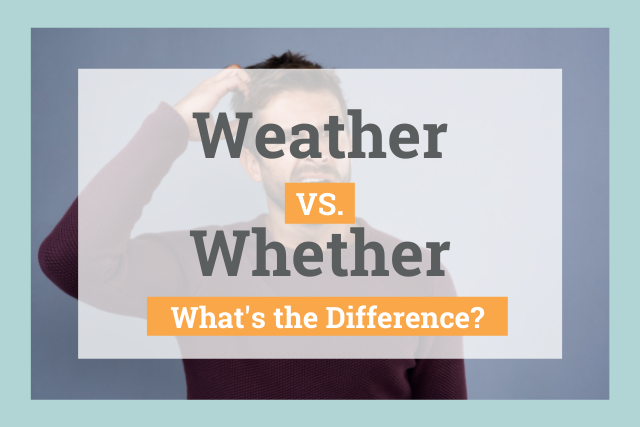
The words weather and whether are part of the “easily confused words” club. They are homophones: words that sound the same, but have different spellings and different meanings.
- Weather refers to atmospheric conditions
- Whether indicates choices or possibilities
You’ve probably come across many homophones in your reading and writing life: affect and effect; accept and except; would and wood—it’s a long list.
While the club may be semi-exclusive, with some careful observation and thought, we can effectively change the name of it to the “not-so-difficult-to-unconfuse-words” club. Okay—so the name needs some work. But the club isn’t the point.
The point is, we can decode the meanings of weather and whether and use them correctly without too much difficulty.

What’s the Difference Between Weather and Whether?
Weather and whether are different words. They don’t share any meanings and cannot be used interchangeably. Weather can be used as a noun or verb, while whether is a conjunction. Let’s dive deeper into each word’s meaning.
What Does Weather Mean?
Weather means different things depending on how it’s used: as a noun or as a verb.
Using Weather as a Noun
The noun weather is probably part of your everyday speech. You listen to weather reports on the news, talk about the weather, and on a temperate day, tell people to “enjoy the lovely weather.”
The noun weather refers to the atmospheric conditions. Temperature, winds, precipitation, clouds—all of those things are weather.
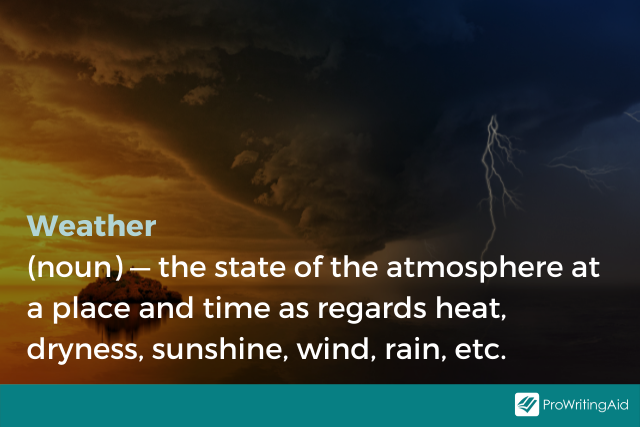
How Do You Use Weather in a Sentence as a Noun?
- We had beautiful weather on our vacation! Every day was sunny, breezy, and warm—but not humid.
- The rainy weather made the commute home slow and stressful.
- We’ve got some winter weather coming, so make sure you’ve got a warm coat and mittens.
- The humid weather is causing really bad hair days.
Usually, the word weather is paired with an adjective that tells what kind of weather. In the examples above, those adjectives are:
- Beautiful weather
- Rainy weather
- Winter weather
- Humid weather
Sometimes, though, weather is used by itself, without an adjective. When that happens, the implication is that the weather conditions won’t be good.
- We see some weather coming toward the Southern states.
- Over the next few days, we’ll be experiencing some weather.
Weather as a Verb
It’s not uncommon to use weather as verb, but this form isn’t as common as the noun weather.
As a verb, weather has several meanings:
to undergo or to endure a trying situation
- She had to weather some difficult financial circumstances.
- You can weather this difficult first year on the job.
- I don’t think I can weather another one of his tantrums.
to erode, discolor, or disintegrate, usually as the result of weather conditions
- The exposure to the elements has weathered the stained glass windows.
- We get new porch pillows every few summers. The elements weather and fade them.
- Regular sun exposure and heavy smoking weather the skin.
to expose to open air (less common)
- Weather the wood to give it an antique look.
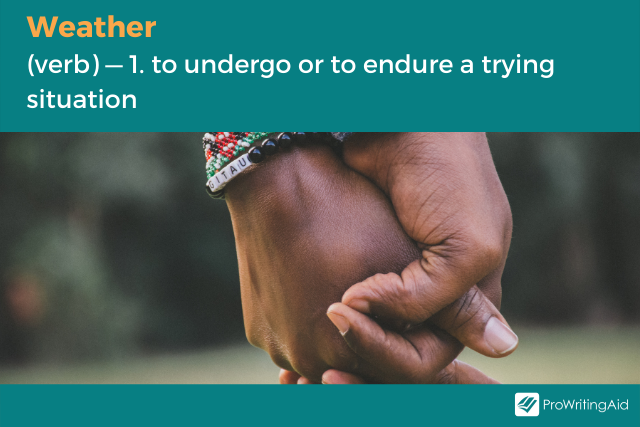
How Do You Use Weather in a Sentence as a Verb?
As you examine these examples, see if you can decide which verb definition of weather is used in the sentence. Also, notice how the form of the word changes depending on tense.
- This past year was difficult, but we weathered through it and are looking forward to better days.
- She’s at least 80 years old, but has such a youthful face. She said her secret was wide-brimmed hats and sunblock, which kept the elements from weathering her skin.
- Even though the couch is inside, the sunlight coming through the window can weather the color of the cushions.
- The old schoolhouse had seen better days. The century-old structure was weathered by its constant exposure to sun, rain, snow, and ice.
- Weathering the oak planks will give the flooring an old farmhouse effect.
- Weathering copper turns it from golden-red to blue-green.
Common Phrases and Idioms Using Weather
The word weather has its place in several common contexts and idioms.
Weather forecast:
- Let’s listen to the weather forecast before we make our plans.
Weather permitting:
- Weather permitting, we’ll have the party outside.
- We’ll have a wonderful day at the beach, weather permitting.
Inclement weather:
- It’s likely the roads will be closed because of inclement weather.
- Due to the forecast of inclement weather, the outdoor concert has been postponed.
Under the weather (not feeling well):
- I’m so sorry I can’t attend. I’m a little under the weather today.
Fair-weather friend/fan (only stay for the good times):
- So they accepted all your kindness and then ignored you when you needed help? They are just fair-weather friends!
Weather the storm (get through tough times):
- Together, we can weather the storms of life.
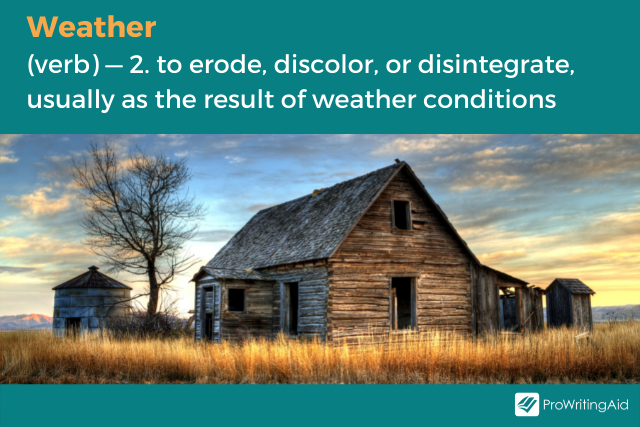
What Does Whether Mean?
The only thing whether has in common with any form of weather is its sound. It doesn’t represent any of the same parts of speech or meanings.
Whether is a conjunction, a word that joins two words, phrases, clauses, or sentences together. Its meaning is similar to that of if.
Here are some more specific meanings from Merriam-Webster:
- If it is or was true that
- If it is or was better
- A word to indicate choices or possibilities
Whether is often used as a correlative conjunction pair with or.
Correlative conjunctions are pairs of conjunctions like neither/nor, either/or, not only/but also, and whether/or. For example:
- He’ll just be miserable whether we take him or not.

How Do You Use Whether in a Sentence?
Here are some examples of how to use whether in a sentence.
- Whether I leave early in the morning or late at night, I still hit traffic!
- I don’t know whether I can attend.
- They weren’t sure whether to invite their abrasive uncle to the family gathering.
- Whether we win or lose, we will have tried our best.
- I wasn’t sure whether she would actually show up on time.
- They had to decide whether or not to operate.
- Whether you agree with the person or not, you should still try to be respectful.
- It was hard to tell whether he was being serious or sarcastic.
Is Wether the Same as Whether?
Yes—there is a third form: wether. It’s not a word the general public knows or uses much. It kind of looks like something’s missing from the word, doesn’t it?
That makes sense, actually, since a wether is a castrated sheep or goat. I hope my mnemonic device isn’t insensitive. But I’ll bet you won’t forget it.
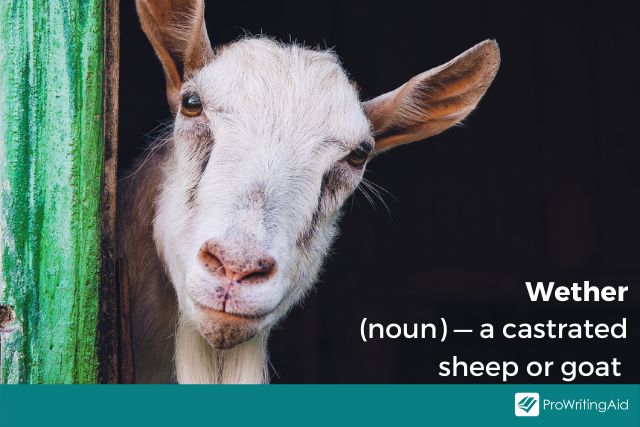
How Do You Remember the Difference Between Weather and Whether?
There’s no perfect “trick” for reminding you of the correct spelling. One suggestion is that weather includes the letters ea, like the word sea, and weather often affects the conditions of the sea. If that works for you, great.
You could use the two words in the same sentence to help remind you of their meanings:
- I don’t know whether there will be good weather for the county fair.
But now that you know what each word means and does, you don’t really need tricks to win the battle of weather vs. whether.
Plus, you can always rely on ProWritingAid’s Homonym Report to alert you to commonly confused words and help you determine if you’ve selected the right one. Knowledge, and ProWritingAid, is power!










